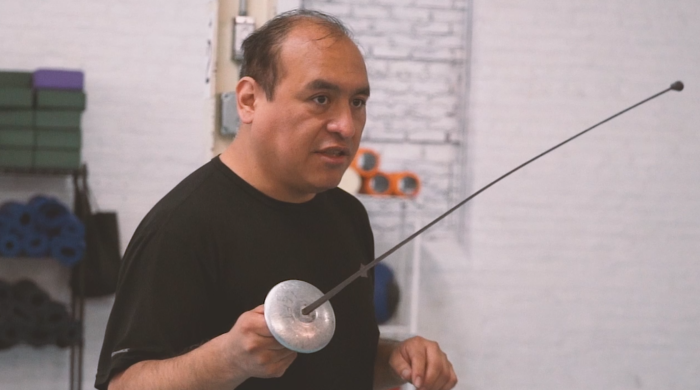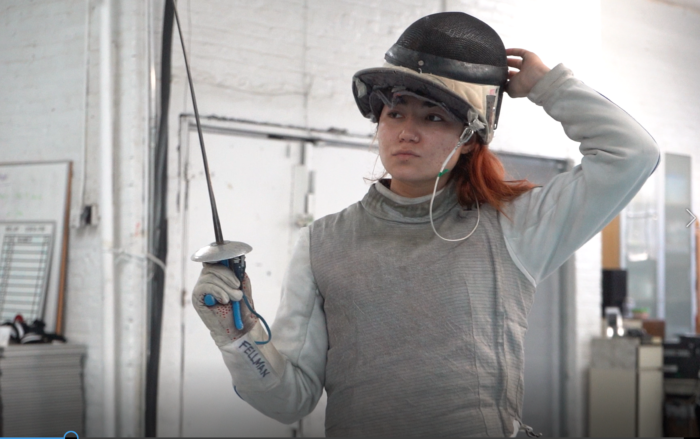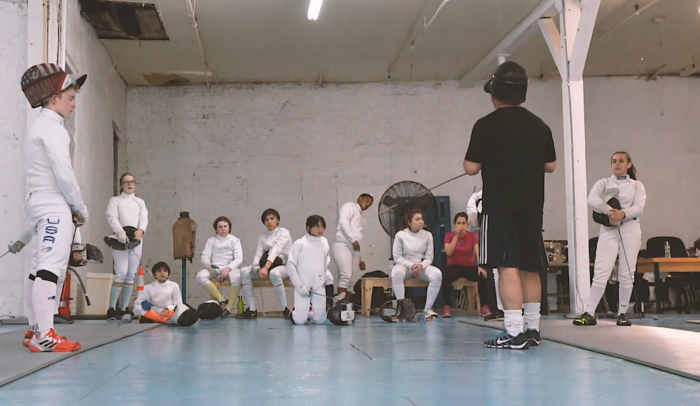Walk down Degraw Street between 3rd and 4th avenues in Gowanus and you’ll see a dance studio, a music studio, two cross-fit gyms, a rock-climbing gym, and an axe throwing bar. On one end of this block, which has become Brooklyn’s unofficial recreational district, is Brooklyn Fencing Center, which coaches children and adults from beginners to experts.
The school offers classes in all three of fencing’s standard weapons–foil, epee and saber–as well as equipment rental and even fencing birthday parties. “It’s literally like my second home,” says Sara Fellman, a high-school student. “I love the people here. It’s very much about respect–and I feel like I’m seen as an equal.”
Rolando Balboa, who has represented his native Bolivia and the U.S. in fencing tournaments around the world, launched the center in 2003. It started out as way of helping others discover the sport that has captivated him since he picked it up in 1993. But he soon realized that enthusiasm wasn’t enough.
“I had to learn to be a businessman,” he says. “I had to separate my passion for the sport [from] the managing aspect and maintain the fluidity of the money, the cash flow, in order to make it work. That’s one of the lessons you learn.”

Rolando Balboa, owner and head coach, has been fencing since 1993
While New York City has been the center of U.S. fencing competition–11 of the 13 fencers on the U.S. Olympic team in 2016 trained at one of the city’s fencing centers–the clubs have traditionally been in Manhattan. After studying the sport himself for eight years, Balboa began teaching it in Brooklyn schools. “I kept trying to encourage the kids to go to fencing clubs in Manhattan, but they just wouldn’t go,” Balboa recalls. “It was later that I realized that the parents didn’t want them to go all the way there and return home late at night.”
One of the parents, seeing how the students got caught up in the sport and wanted to learn more, suggested that Balboa start his own fencing club in Brooklyn. “At first I was reluctant, but in 2003, there was nothing in Brooklyn, so I thought, Why not?” The club started out in rented dance studios but found a spacious home for a decade on Hoyt Street in Carroll Gardens in a repurposed industrial building.
Students engaged with their sport at Brooklyn Fencing Center (Video by Anurag Papolu for The Bridge)
Along the way, Balboa has dealt with real-estate challenges that would be familiar to many business owners in Brooklyn. He had to move out of the Hoyt Street building because the landlady decided to sell the building. The new lease in Gowanus was more expensive for less space. “That was a real eye opener,” he says.
Balboa’s primary goal has been to keep the club open and affordable to his students. He says that if getting rich from the business were his mission, then starting a fencing club in Brooklyn wouldn’t be the best way to go about it. “It’s a sacrifice that I made to maintain the club for the kids, so if it means that I would use my salary to make it work, I did.”

Says Fellman: “It’s very much about respect–and I feel like I’m seen as an equal”
Even so, several of Balboa’s colleagues and students have followed in his footsteps, opening their own fencing clubs around Brooklyn, including the Brooklyn Bridge Fencing Club in Dumbo and South Brooklyn Fencing in Sunset Park.
The tone that Balboa has aimed to set for his center is one of friendliness, even if the sport is a martial art. “A kid that comes in through the door doesn’t really know whether they’ll like it or not,” he says, “so it has to be fun at the beginning. Not just fun, but also welcoming.”

A class listens to Balboa. Says he: “Sometimes you win, sometimes you learn”
Julian Fevry, a student at the club, affirms that notion. “I think the environment that he creates here is very, very positive. It’s very strong,” he says. “With any high-level, intense sport, there’s always a sense of focus. But in the focus there also has to be a sense of fun, and I think he incorporates that very well.”
Balboa’s students are currently in preparation for the competitive season, which starts at the end of summer. First, his students compete among themselves, and then progress to unranked tournaments, competing against other fencers in the city. Then they progress to ranked tournaments. Balboa’s goal is to have them participate in national level tournaments, just as he did. Several students at the club have already competed internationally.
“The idea is to give them the experience and give them the ability to learn by dealing with the frustration that you have in the competitions,” said Balboa, “because yes, you want to win, but you cannot win all the time. Sometimes you win, sometimes you learn,” he said of his students. But he could’ve easily been talking about himself.